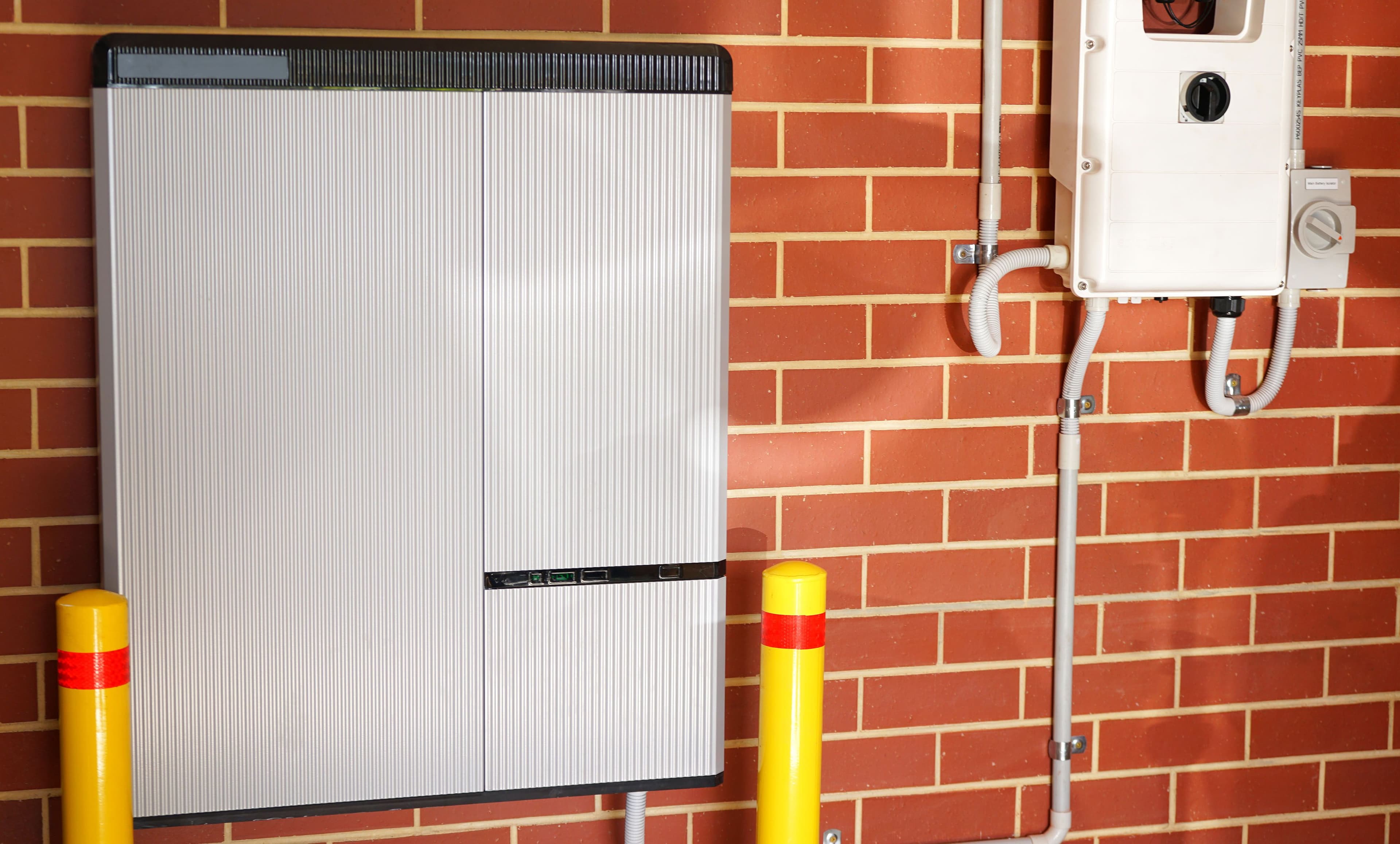
Solar batteries: Self-sufficiency, Benefits
Solar batteries for your solar panels.
If you are looking to maximize your energy independence, solar batteries are your answer. By installing storage batteries, you not only capture and store the excess energy your solar system produces during the day, but also ensure you have a constant supply even during cloudy nights and days.
Energy storage for a brighter tomorrow
Imagine being able to make the most of every ray of sunshine. With the addition of self-consumption batteries you embark on a journey towards greater energy independence. These batteries allow you to store the surplus solar energy you generate, giving you the freedom to use it when you need it most.
Reduce your dependence and save
Our goal at Quiero Sol is to boost your energy autonomy. Batteries for solar panels free you from dependence on the conventional electrical grid. This not only gives you peace of mind during power outages, but also reduces your long-term electricity costs. With the stored energy, you will light up your nights and keep your devices running even on less sunny days.
Power your home with solar batteries
Solar batteries are not only functional, they are also environmentally friendly. By making the most of the solar energy you generate, you reduce the need for conventional energy sources, thus reducing your carbon footprint.
Make your home or business more self-sufficient
Complement your system with a solar battery and turn your home or business into a benchmark of energy self-sufficiency. By combining your solar panels with storage batteries, you will not only reduce your electricity bill and maximize your savings, but you will also take advantage of the excess energy produced during the day.
Thus, you can use it at night or on cloudy days, ensuring a constant supply even when the sun is not shining. With the integration of solar batteries or even a portable solar battery, you are one step closer to total energy independence.
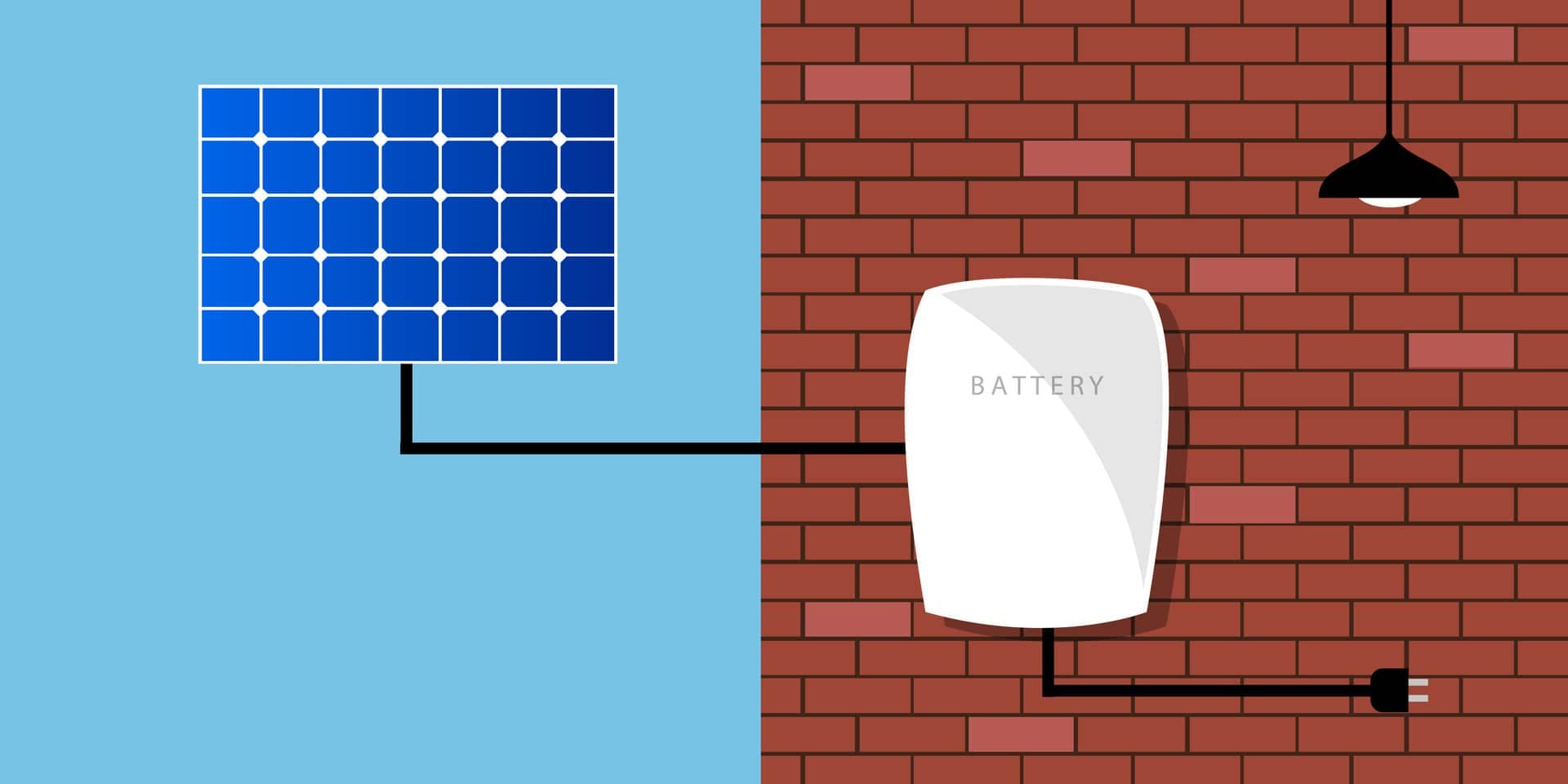
Operation of solar batteries.
What is a storage battery and its relevance to solar systems?
A storage battery, also known as an energy storage system (ESS), is a device designed to conserve electrical energy and release it when needed. In the context of solar energy, these batteries play a crucial role: they store the electricity generated by solar panels for use at times when there is not enough sunlight, such as at night or on cloudy days. In addition, they allow you to take advantage of energy when grid prices are higher, maximizing your savings.
What are solar batteries and how do they differ from other batteries?
Solar batteries are specifically designed for solar energy systems. Their main function is to accumulate the excess energy produced during the hours of maximum solar radiation and release it at times of lower solar production or during the night. Thus, they guarantee a constant energy supply, increasing the efficiency and self-sufficiency of your solar system.
How do solar storage batteries work?
The magic behind these batteries lies in a process called three-phase:
- Solar generation: Solar panels capture the sun's energy and convert it into electricity.
- Storage: Any electricity that is not used immediately is sent to the solar batteries, where it is transformed and stored as chemical energy.
- Discharge: When the solar production does not meet the energy demand, the energy conserved in the batteries is released, ensuring a constant flow of energy, even in times without sunshine.
Finally, it is vital to understand that solar batteries have a life cycle, going through multiple charge and discharge cycles, which determines their performance and durability.
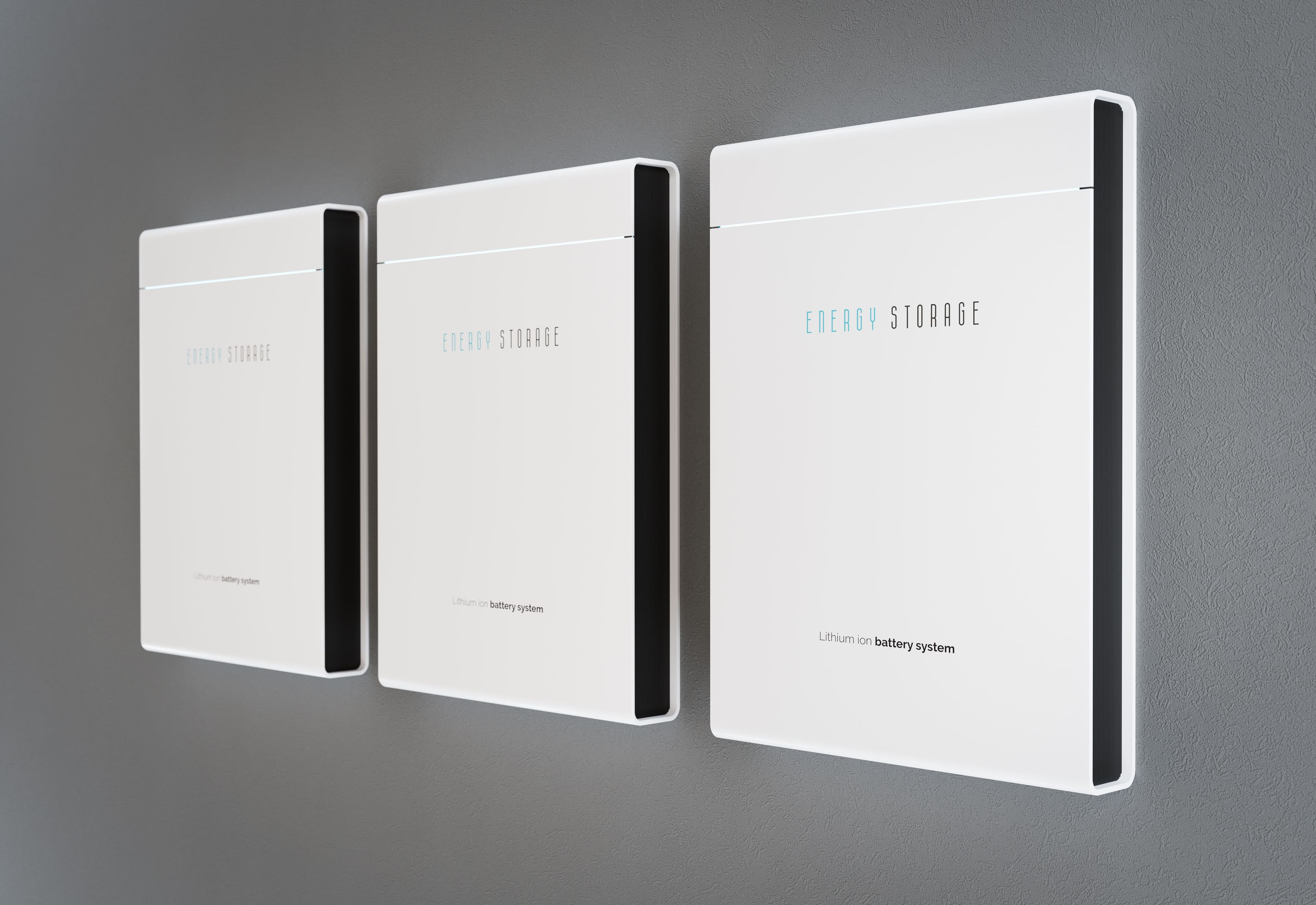
What types of solar batteries are there?
The world of solar batteries is diverse and constantly evolving, offering different technologies to suit the needs of each solar project. Among the most common and recognized types, we can distinguish:
- Lead-acid batteries: This type of solar battery is one of the most traditional. Their popularity lies in their affordable cost, being ideal for emergency backup systems and initial solar projects.
- Lithium-ion batteries: Their growth in the market is remarkable, and no wonder. With high energy density, superior efficiency and long life, these solar batteries are the choice for many residential and commercial storage systems, as well as in electric vehicles and power-hungry devices.
- Flow batteries: Differing in their electrochemical design, flow batteries are positioned for large-scale applications. Their ability to store vast amounts of energy at a competitive cost makes them ideal for large-scale storage projects.
- Sodium-ion batteries: Although they are a newer option in the solar battery landscape, they have great potential. With a focus on safety and cost optimization, this technology promises to be an efficient alternative to lithium-ion batteries in the future.
When considering the adoption of a solar panel battery for your system, it is essential to know these differences and choose the one that best suits your needs, ensuring optimal performance and durability.
Comparative Table of Solar Battery Types
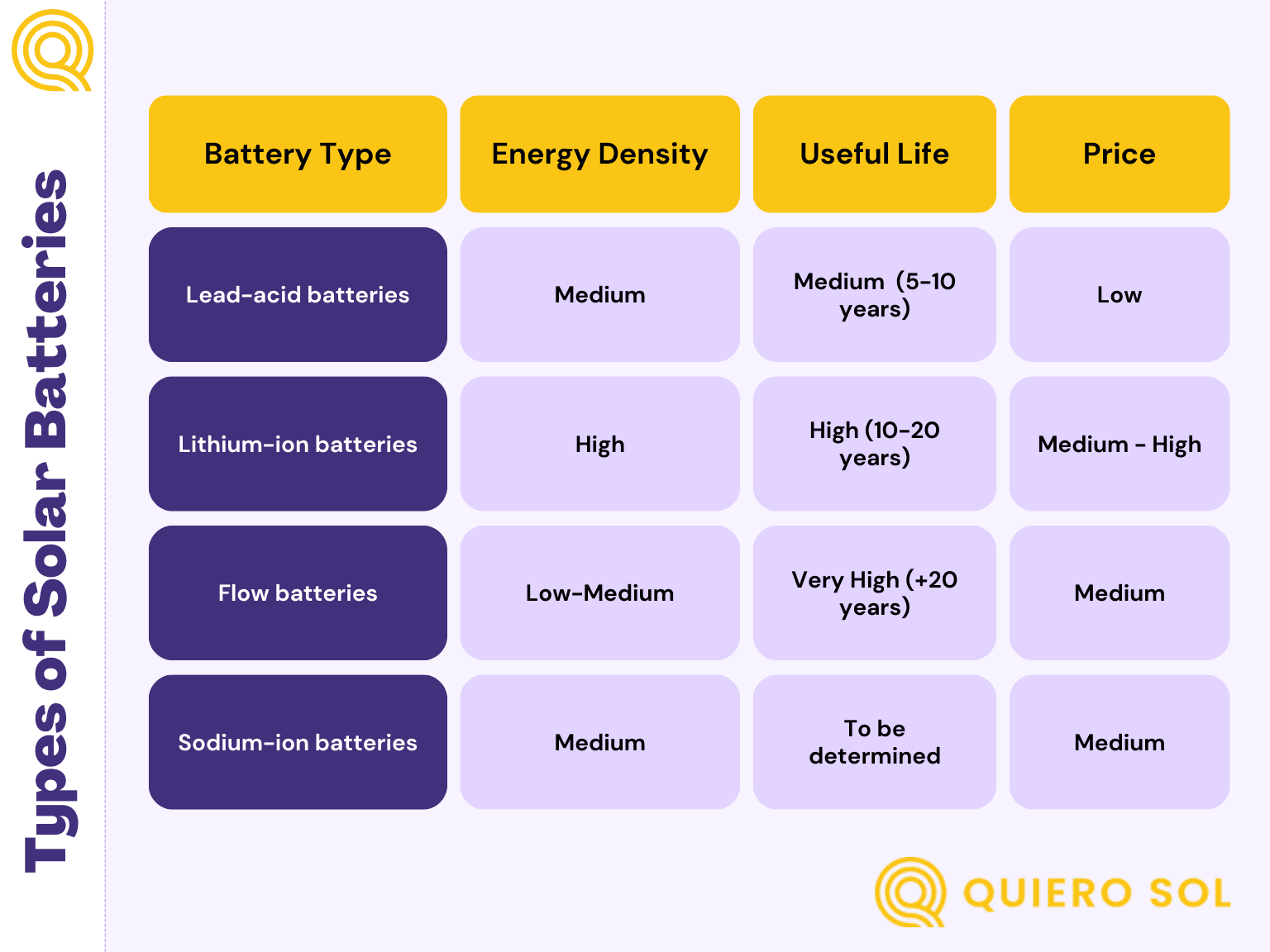
Energy Density: The amount of energy a battery can store in relation to its size or weight. The higher it is, the more energy it stores in less space.
Useful Life: Number of charge and discharge cycles a battery can perform before its capacity decreases significantly.
Cost:
- Low: Affordable price, ideal for small-scale systems or tight budgets.
- Medium: Balanced relationship between quality and price.
- Medium-High: Higher initial investment but with superior characteristics.
- High: High price, but technologically advanced with the best performance.
How many kWh does a solar battery store?
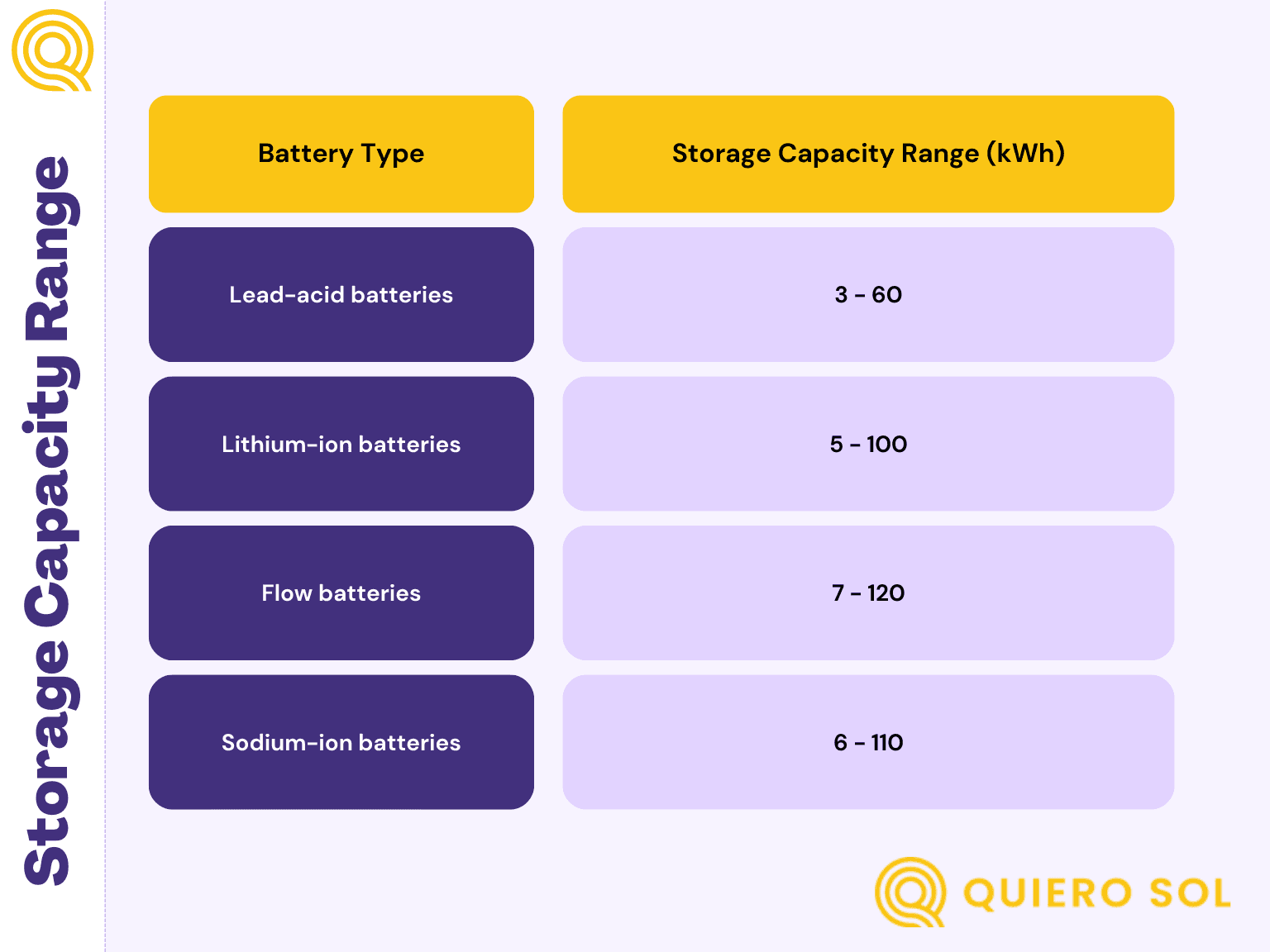
The amount of kWh a solar battery can store depends on several factors that influence its design and technical specifications. Key elements such as size, nominal capacity, battery voltage, charge and discharge efficiency, battery technology, ambient temperature, charge and discharge cycles, and system control are determinants of its storage capacity.
It is important to consider these factors when selecting a solar battery for your energy storage system. The amount of energy you will be able to store will vary depending on your specific energy needs, consumption pattern and other elements particular to your application. At Quiero Sol, we are committed to providing you with the advice you need to choose the battery that best suits your requirements and maximize the efficiency of your solar energy system.
These ranges are approximate and may vary by battery make and model. The choice of storage capacity will depend on your specific energy needs and the consumption patterns of your home or business. At Quiero Sol, we are here to help you find the perfect solar battery for your energy and storage system.
What are the best batteries for photovoltaic panels?
To achieve high self-sufficiency and maximize the efficiency of the solar energy generated, lithium-ion batteries top the list of recommendations. These batteries stand out for their high efficiency, excellent energy density and long life compared to other alternatives on the market. Some key advantages include:
- Efficiency and energy density: They can store a considerable amount of energy in a compact space, making them ideal for photovoltaic systems.
- Service life: With an extended service life, they typically offer warranties of around 10 years, making them a profitable long-term investment.
- Fast charging and deep discharge: These batteries allow fast recharging and can be deep discharged without compromising performance or durability.
- Compact and lightweight design: Its compact nature facilitates installation and is especially useful in tight spaces.
Recommended models include the Huawei Luna battery and the modular lithium battery, both recognized for their superior performance and reliability in solar power systems.
What is the price of solar batteries?
The price of solar batteries can vary significantly depending on the technology and storage capacity. Below is a summary of estimated prices by battery type
Lithium-ion batteries:
- Price: Between 800 to 1,000 euros per kilowatt-hour (kWh).
- Performance: These batteries tend to have a higher price due to their high efficiency, performance and durability.
Lead-acid batteries:
- Price: They range from 150 to 400 euros per kWh..
- Characteristics: Although they are a cheaper option than lithium-ion batteries, they may have a shorter life and lower energy density.
Flow batteries:
- Price: They range from 1,000 to 1,500 euros per kWh.
- Special feature: Although they have a higher cost per kWh compared to the two previous types, they are especially valued in large-scale energy storage applications.
It is important to consider that these prices are estimates and may vary depending on the manufacturer, region and specific characteristics of the product. At Quiero Sol, we always recommend to consult with our experts to get the best information and advice on the most suitable product for your needs.

Solar lithium batteries: are they expensive?
This depends on the size of the battery. Generically, we can say that a solar battery costs between €4,000 and €8,000 with installation.
For many homeowners, lithium batteries may seem like an expensive initial investment. However, at Quiero Sol we believe it is vital to look beyond the initial price and analyze the big picture.
Currently, it is true that household batteries may not be fully amortized before their warranty expires, which is generally 10 years. This leads some people to postpone the purchase, hoping that the economics of batteries will improve. However, it is important to note that we are already seeing a downward trend in battery costs. Thanks to technological advances, growing demand and improvements in manufacturing processes, lithium batteries are becoming more affordable.
In fact, at Quiero Sol we have noticed that, as with solar panels, household batteries have experienced significant cost reductions in recent years. These reductions are already making lithium batteries make both economic and environmental sense for many households.
Therefore, while we may not yet be at the cost-benefit sweet spot, it is anticipated that in the near future, in the range of three to ten years, lithium batteries will become such an obvious economic choice that it will be essential to have one in the home.
At Quiero Sol, we encourage you to stay informed and consult with our experts to understand how these changes can benefit you on your path to energy self-sufficiency.
What are the problems with lithium solar batteries?
Lithium batteries, while proving to be a revolutionary technology, are not without their challenges. At Quiero Sol, it is important that our customers are informed about the considerations they need to take into account:
- Initial cost: Compared to technologies such as lead-acid batteries, lithium batteries tend to have a higher initial cost. Although this gap is narrowing with technological advances and growing demand, they still require a more significant upfront investment.
- Limited storage capacity: Lithium batteries have limited storage capacity compared to some alternatives, such as flow batteries. In large-scale storage applications, multiple lithium batteries may be required to meet capacity demands.
- Degradation over time: As they undergo charge and discharge cycles, lithium batteries can experience some degradation and loss of capacity over time. Although recent advances have improved this degradation rate, it is still relevant in long-term planning.
- Temperature and safety: Lithium batteries are sensitive to temperature extremes, and overheating can create problems. Maintaining proper conditions and employing appropriate cooling systems is essential.
- Resource availability: Lithium is a finite natural resource, and its availability could face challenges as demand for lithium batteries increases, encompassing applications such as electric vehicles and energy storage systems.
- Recycling and disposal: The proper recycling management of lithium batteries is crucial to minimize their environmental impact. Improper disposal could result in the release of toxic substances into the environment.
How many batteries are needed for a solar panel system?
The number of batteries required for a solar panel system varies according to the specific circumstances of each installation and its energy requirements. At Quiero Sol, we consider it essential to take into account several factors to make the right choice. Here is a simplified guide to understand this process:
- Determine daily consumption: Before doing anything else, it is crucial to know how much electricity is consumed per day, whether in a home or a business. You can obtain this data from electricity bills or by using a consumption meter.
- Set days of autonomy: This refers to how many days you would like the batteries to supply power without relying on solar charging, for example, during long nights or cloudy days.
- Total storage capacity: Once the two previous points have been established, multiply the daily consumption by the days of autonomy. Thus, if your daily consumption is 10 kWh and you want 2 days of autonomy, you will need batteries with a combined capacity of at least 20 kWh.
- System efficiency: Not all batteries release every bit of energy they store. Depending on the type of battery, there is a certain amount of energy loss. Typically, this loss ranges from 10% to 15%, so it is critical to add this additional percentage to the total capacity calculation.
With these factors in mind, Quiero Sol helps our customers select the number and type of batteries that best fit their energy needs. It is always advisable to work with a professional when making decisions about storage capacity to ensure an optimal and efficient solution.
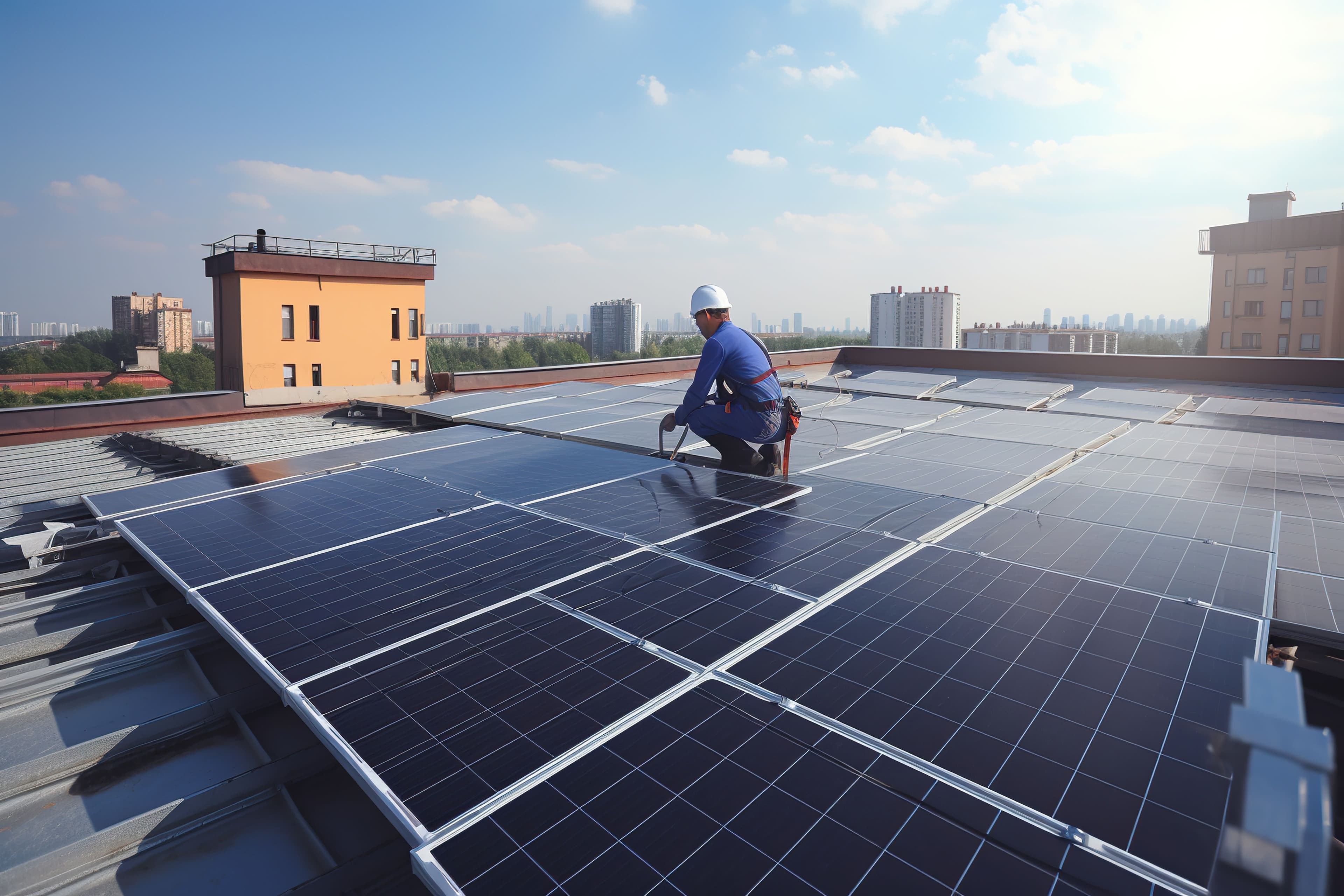
What to consider when comparing solar batteries?
When selecting the right solar battery, it is essential to evaluate a series of aspects that guarantee optimal performance and a satisfactory return on investment. At Quiero Sol, we provide you with a guide to make informed decisions and maximize the benefits of your solar energy system:
- Storage Capacity: Storage capacity, measured in kilowatt-hours (kWh) or ampere-hours (Ah), is crucial. It determines how much energy the battery can hold and for how long it can supply your energy needs.
- Efficiency: Look for batteries with high efficiency, which means optimal energy recovery during charging and discharging. Higher efficiency translates into improved performance and less energy loss.
- Life Cycles: Consider the number of charge and discharge cycles the battery can handle before experiencing significant degradation. More cycles usually indicates durability and a sound long-term investment.
- Response Time: Evaluates the time the battery requires to charge and discharge energy. Fast speeds can be advantageous for applications that need quick changes in energy flow.
- Compatibility: Verify that the battery is compatible with your existing solar system and the inverter in use. Each system may have specific requirements for optimal performance.
- Size and Weight: If space is limited, consider battery dimensions and weight. Compact and lightweight versions are ideal for installations in tight spaces.
- Cost: Compare costs and value for money between different options. Analyze initial value, useful life and total costs, including maintenance and eventual replacements.
- Warranty: Check the warranties provided by the manufacturers. A solid warranty provides security and coverage for potential problems.
- Safety: Verify safety features, such as protection against overloads, excessive discharges and short circuits, ensuring reliable operation.
At Quiero Sol, our priority is for you to make informed and appropriate decisions for your energy needs. Contact us for personalized advice and ensure the maximum performance of your solar system with the ideal battery. CTA
How to benefit from European funding for batteries?
At Quiero Sol, we know how to take advantage of funding opportunities to facilitate the transition to more sustainable energy. European funding grants are part of the Recovery, Transformation and Resilience Plan, and can be a valuable aid if you plan to incorporate batteries into your existing solar system.
In the specific case of wanting to add batteries, the subsidy can range from €140 to €490 per kilowatt-hour (kWh) of battery capacity you install. Imagine you want to implement a 5 kWh lithium battery; in this scenario, you would receive a subsidy of €490 per kWh, which translates to a total of €2,450 in subsidy.
This opportunity gives you the chance to significantly reduce your project costs, making moving towards more efficient energy more achievable. At Quiero Sol, we are here to accompany you every step of the way, from evaluation to application submission. Don't miss the opportunity to take advantage of these grants to make your solar battery project a reality and contribute to a more sustainable future.
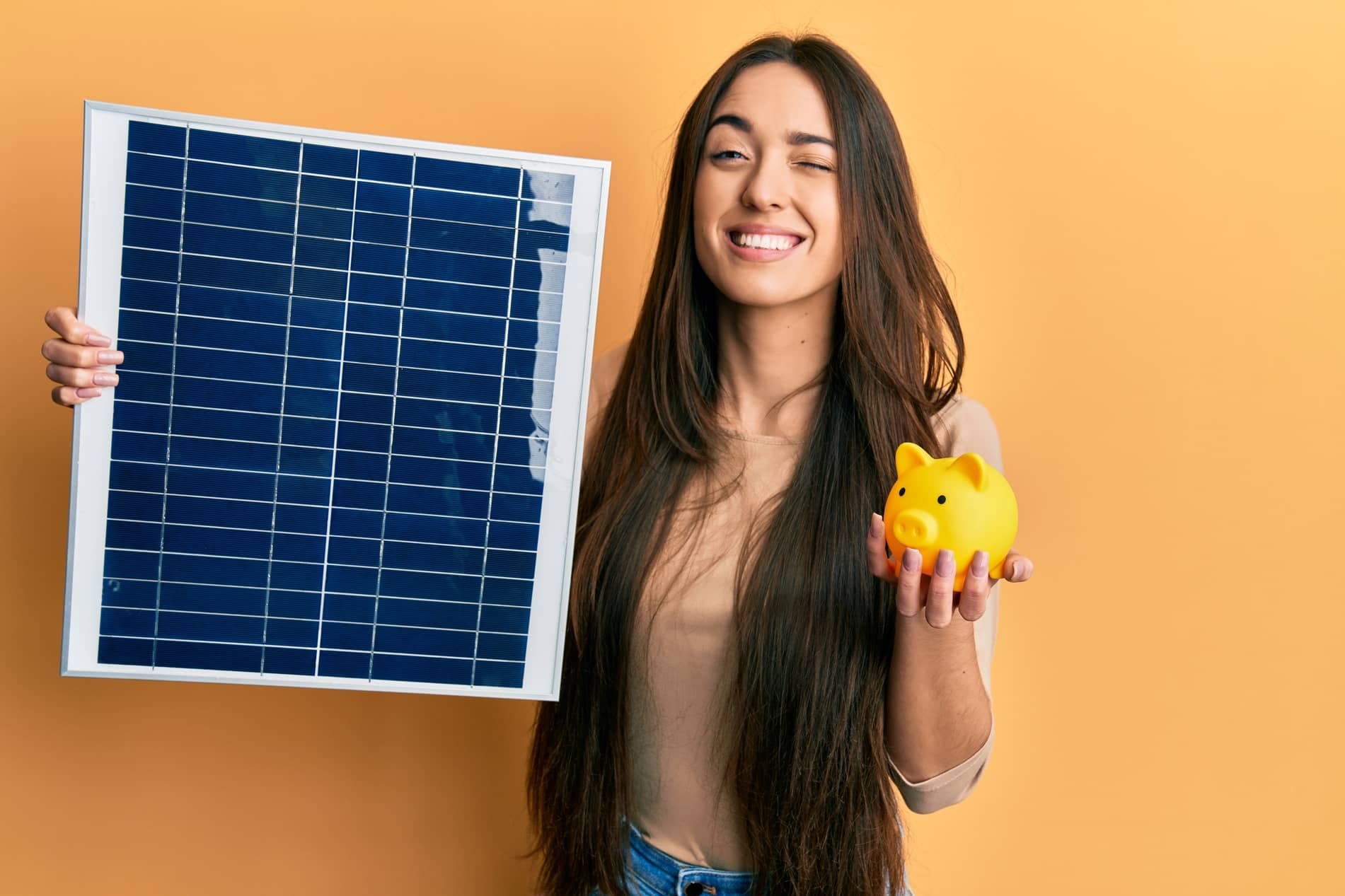
How long does a solar battery charge last?
Solar batteries are essential for storing the energy generated by your solar panels and using it when you need it most. In general, solar batteries have discharge cycles that can last around 100 to 120 hours, allowing you to have power for a period of 3 to 6 days.
The charging duration may vary depending on several factors, such as the power of your system and the electrical consumption of your home. For example, consider a home with a 5 kW/h battery and 1.2 kW/h electricity consumption. In situations where there is no PV production, such as at night or on cloudy days, this battery could supply electricity to the home at a rate of 1.2 kW for 4 hours. However, it is important to note that the supply time could be reduced if consumption is higher.
In addition, it is relevant to note that many batteries do not deep discharge to maintain their life and protect themselves. This means that they always retain some charge to ensure long-term operation.
How long does a solar battery last? How many years does it last?
The lifetime of a solar battery is a matter that varies depending on several factors, generally ranging from 5 to 15 years. When deciding on a solar panel battery, it is essential to consider aspects such as the frequency and depth of discharge. For example, batteries that are constantly discharged and recharged tend to have a shorter life than those that maintain a balanced charge and discharge rate.
Also, temperature conditions play a crucial role; high temperatures can accelerate their degradation, while a cool environment can be beneficial to their longevity. It is equally important to have an efficient control and maintenance system, as well as to choose quality batteries from reliable manufacturers.
Among the options on the market, lithium-ion solar batteries stand out for their durability, offering up to 15 years or more in optimal conditions, while lead-acid batteries can last between 5 to 10 years. Regardless of the type, ensuring good operation and maintenance is critical to maximize the life of any portable or stationary solar battery.

What needs to be done to make the battery last longer?
To ensure longer life and greater efficiency of your solar battery, it is essential to consider several factors. It is not recommended to discharge the solar battery beyond 50% to preserve its lifetime. In addition, installation should be done according to the manufacturer's instructions and in a well-ventilated space to prevent overheating.
Proper charge and discharge management is crucial; avoid pushing it beyond the limits suggested by the manufacturer and practice moderate cycling to prevent frequent full discharges. It is vital to keep the solar battery away from extreme temperatures, as high temperatures can accelerate degradation. Implement regular maintenance, following the manufacturer's guidelines and use control systems that optimize its operation, preventing adverse conditions such as overcharging.
If your solar battery has software or firmware updates, keeping it up to date is key to its optimal performance. And, if you choose to store it, follow the manufacturer's recommendations to ensure proper preservation. By following these tips, you will not only prolong the life of your solar batteries, but also ensure efficient performance over time.
Request quotes here!
If you want more information about solar batteries or if you are thinking of installing one, request quotes with different installers without obligation here.
